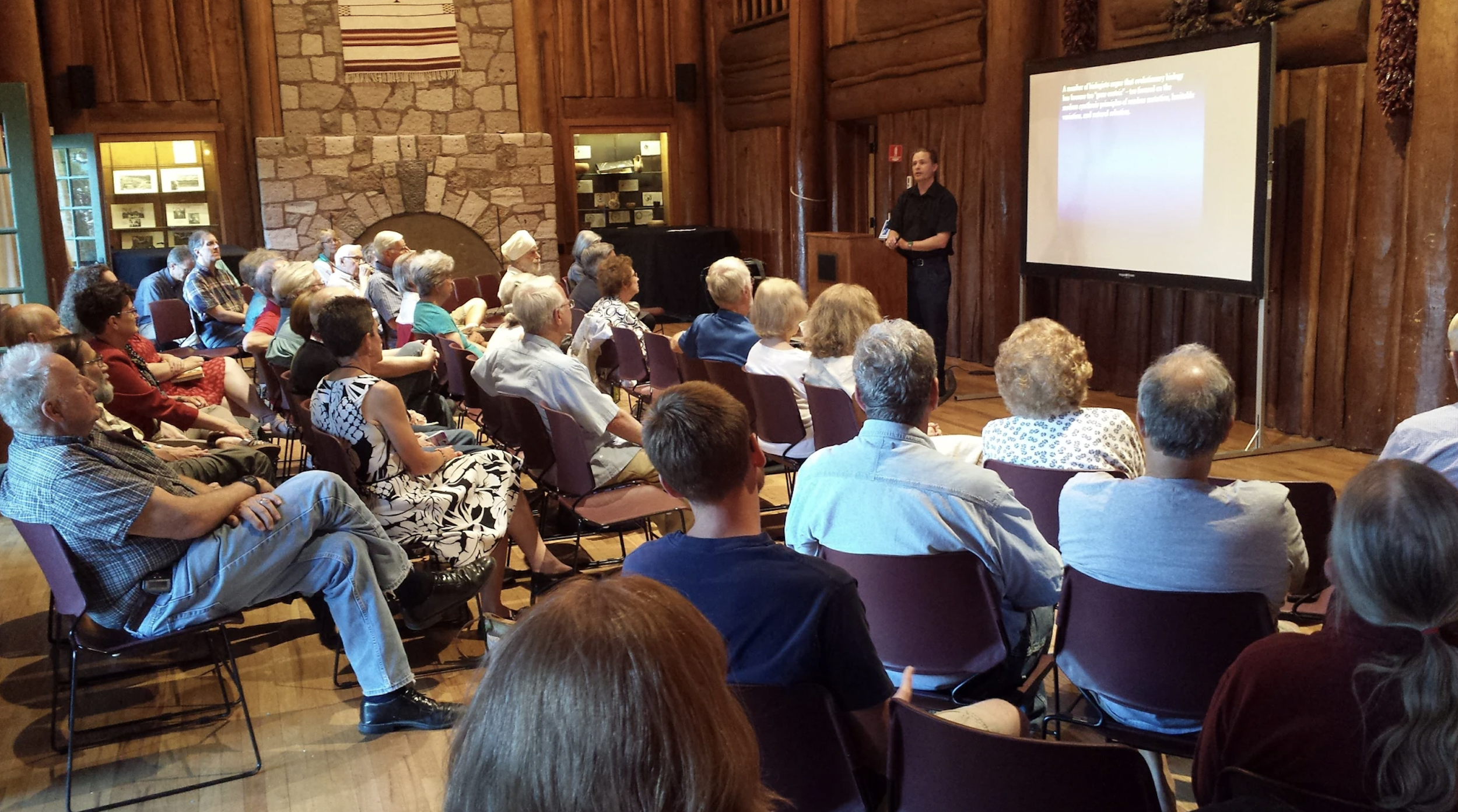
Summer 2018
June 6, 2018- Introduction: Why Study Evolution?
Dan Winske
Abstract. The first talk of the 2018 Summer Series introduces its overall theme “Purposeful Evolution” by asking: What is evolution? Why study it now? And why are science and religion mostly congenial except when discussing evolution? A preview of the upcoming lectures and information about the external speaker, Dr. Dennis Venema, is also presented.
June 13, 2018- How Life Works
Nels Hoffman
Abstract. To discuss recent ideas in evolutionary biology, we need to know a bit about how life works. This lecture will be an introduction to biology for people who don’t usually think about it. We’ll talk about the cell, metabolism, genetics, and reproduction. We’ll discuss amino acids, proteins, enzymes, and how proteins are made, and we’ll touch on the genetic code, genes, chromosomes, and two ways that cells reproduce. By the end of the lecture, you’ll know the difference between your phenotype and your genotype, and why they matter. And you’ll be ready to tackle concepts like epigenetics, horizontal gene transfer, genome reorganization, and plasticity, when they come up later this summer. A list of useful definitions will be handed out, for future reference.
June 20, 2018- Evolution Observed and Thought About
Chick Keller
Abstract. Our current understanding of how the Earth came to be filled with different, but apparently related, animals is that they evolved from simple organisms to the very complex ones we see today. Thus, complex life (including humans) appeared gradually through evolution. However, current theories of evolution seem to say that this process is entirely random. But this would rule out a creator whose creation would have purpose built in. In order, however, to reject evolution, so-called “Young-Earth Creationists” had to formulate reasons why it was wrong. Among these were two: (1) there was no way to tell how old the earth was, and (2) the fossil evidence shows, not a gradual procession of individuals exhibiting small changes, but rather species seemed to appear fully formed without any intermediate life forms. This talk will show the fossil evidence for evolution and will address the problem of intermediate forms showing that they do indeed exist. In addition, it will comment on methods of determining the age of rocks. Finally, we will discuss the evolution itself of theories to explain these fossils from Darwin and Wallace to the mid-20th century (subsequent talks will introduce the latest modifications to evolutional theory showing that it is not always random and indeed seems guided.)
June 27, 2018- Beyond the Neo-Darwinian Evolution Synthesis
Glenn Magelssen
Abstract. Most of us are familiar with Darwin’s ideas about evolution. For example, natural selection and, more recently, the role that genetics and small random mutations play in the evolutionary process ( Neo-Darwinian synthesis). In addition to the Neo-Darwinian synthesis, our talk suggests additional methods of evolution. We will discuss “Epigenetics”: inheritance as a result of environmental change which does not involve changes in the DNA, “Symbiogenesis”: changes due to symbiotic relationships and horizontal gene transfer not based on accumulation of mutations, leading to new species, and “Niche Construction”: how humans and other organisms change their environment, leading to a feedback of environmental changes onto the organism, changing them and their evolutionary direction.
July 18, 2019- Can Organisms Drive Their Evolution?
Nels Hoffman
Abstract. A growing group of researchers within evolutionary biology seeks to put new emphasis on a set of ideas that differ considerably from the gene-centric viewpoint of Neo-Darwinism. In the Neo-Darwinian view of evolution (i.e., adaptation driven by random mutation coupled with natural selection and genetic drift), organisms are the passive products of their genes and environments. But the new emphasis elevates the organism to a position of active participation in the evolution of its species, recognizing phenomena such as phenotypic plasticity (the ability of an organism to change its form, behavior, or physiology in new surroundings without any change at all in its genes, which may follow along later); gene transposition (“jumping genes”, the process of large-scale reorganization of the genome, perhaps driven by the cell in response to stress); niche construction (whereby organisms indirectly drive their evolution through modifications they produce in their environment); and inclusive inheritance (the recognition that traits pass from parents to offspring not through genes alone, but through ecological effects, social learning, parental effects during development, and epigenetics – the switches that turn genes on and off). Just how important these phenomena have been during evolutionary history remains an open question, while Neo-Darwinian processes unquestionably play a large role. But for now, the new emphasis is stimulating much research into new directions. It may also make it philosophically appropriate to ask what the organism wants or intends – a question which is of no interest in the Neo-Darwinian view.